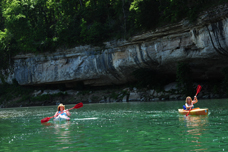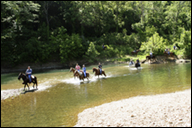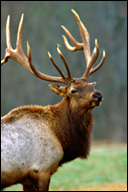Jill M. Rohrbach, travel writer
Arkansas Department of Parks and Tourism
2012-08-27 — /travelprnews.com/ — Join the celebration of the 40th anniversary of America’s first national river from 10 a.m. to 6 p.m. on Saturday, Sept. 1 at a public event at the pavilion at Tyler Bend, located off Ark. 65 north of Marshall.
Meandering through the Arkansas Ozarks for almost 135 miles, the Buffalo River was designated the country’s first national river in 1972. During the anniversary event, park staff will be on hand to share their experiences and talk about their work at the park. There will be a number of youth activities.
Caven Clark with the National Park Service says the public will be able to visit with park staff, look at images telling the story of the creation of the park and what goes on to protect, preserve, inform, and improve it. Exhibits are based on park organization themes and will be staffed by representatives of those divisions: fire, interpretation and education, natural resources, cultural resources, administration, and maintenance.
Clark adds that food and refreshments will be available for purchase from the “Sugar Shack.”
Some of the park’s partners, including the Back Country Horsemen of America and the Buffalo National River Partners, and Healthy Kids – Healthy Ozarks will be on hand to tell how their organizations assist the National Park Service in meeting its goals.
Along the corridor of this free-flowing stream, the National Park Service oversees 95,730 acres used for various activities such as floating, fishing, camping, horseback riding, hiking, caving, wildlife watching, and hunting.
The Buffalo National River has three designated wilderness areas within that acreage. Tall limestone bluffs in earthy hues of gray, tan and brown are defining features of the Buffalo. Rushing whitewater is interspersed among sections of calmer water as the river wends its way through the lush green valley that is home to elk, deer, black bear and other woodland creatures.
Over the years, millions of people have taken advantage of this landscape that is still free, wild, natural. Licensed by the National Parks Service, concessioners for the upper, middle and lower sections of the Buffalo River rent canoes, kayaks, rafts, and johnboats and provide shuttle services. Typically, the float season begins in spring with ample water to float the upper section on down. Spring rains make the river attractive for people seeking a higher level of challenge with whitewater rapids. The float season moves downstream with the months. But, because the Buffalo is largely rainfall dependent, floating opportunities for each section change not only from season to season, but week to week with precipitation.
Bill Scruggs of Wild Bill Outfitters on the lower Buffalo says outfitters are putting people on the river right now despite the drought. “They’re still going and still enjoying it,” he adds. He says the river has actually come up a few tenths because of recent rains. The best way to get information about water levels is to call an outfitter in the section you want to float. All concessioners are listed on the NPS website, www.nps.gov/buff/index.htm, where you can also click on “River Levels.”
In addition to floating, hiking Buffalo River country is a popular activity year round. Late fall and winter are the preferred months by most hikers because leafless trees allow for better views and ticks are less of a worry. Of course, trails in the Buffalo country are open all year. Some offer views from the top of the limestone bluffs. Other treks snake through the woods past remnants of old homesteads and down old logging roads.
To rock climbers Sam’s Throne is probably the most well-known chunk of rock in the Ozarks. Another hot place to climb in Buffalo River Country is on private land owned by Horseshoe Canyon Ranch, where you can pay to climb. Already nationally known, it is gaining international recognition in the climbing community because of its accessibility and more than 300 bolted routes to choose from for beginners to professionals.
Another activity that’s easy for the whole family to enjoy is wildlife watching, particularly of elk. One hundred and twelve Rocky Mountain elk were introduced to the area in between 1981 and 1985 and the herd has grown to around 450. While not confined to the park, the herd is predominately found around the upper Buffalo. The large beasts prefer open areas for grazing with nearby wooded areas for resting. Drivers often stop their cars along roads in and around Boxley Valley to view elk in the fields. Dusk and dawn are the best times to watch them.
There’s really something for everyone in Buffalo River Country. Fishermen will find a wild fish population of over 60 species, including small mouth bass, largemouth bass, Ozark bass and goggle-eye. For horseback riders the Buffalo also has over 100 miles of hiking and horse trails. Horseback riding concessions can be found in Buffalo River Country, many of which are associated with lodging. While concessionaires aren’t allowed to ride on the river, they have plenty of their own scenic trails in the river country.
Full of scenic beauty, the Buffalo retains cultural and natural history also. Visit http://www.nps.gov/buff/index.htm for more information from settlement history, to architecture, logging, mining, community development, transportation and agriculture of the Buffalo River area.
####
Submitted by the Arkansas Department of Parks & Tourism
One Capitol Mall, Little Rock, AR 72201, (501) 682-7606
E-mail: info@arkansas.com
Photos Available: http://arkansasmediaroom.com/; 501-682-7609




